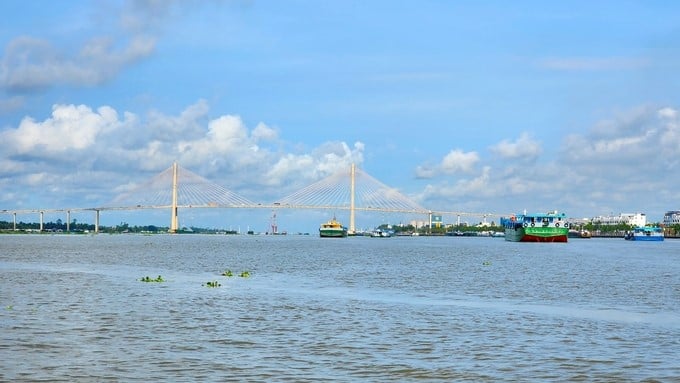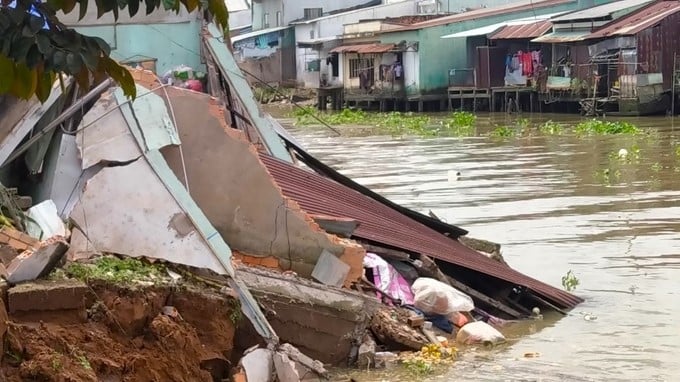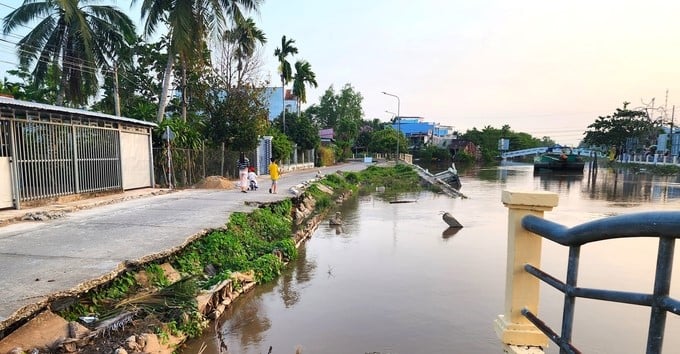May 16, 2025 | 09:04 GMT +7
May 16, 2025 | 09:04 GMT +7
Hotline: 0913.378.918
May 16, 2025 | 09:04 GMT +7
Hotline: 0913.378.918
Inherently being a key region for national food security, in recent years, the Mekong Delta has contributed about 18% of the country's GDP, more than 94% of total rice exports, approximately 60% of seafood export turnover, and 70% of fruit output.

The implementation of Resolution 120 on the sustainable and climate-resilient development of the Mekong Delta contributes to resolving many of the region's challenges in agricultural production in particular and economic development in general. Photo: Kim Anh.
In recent times, the Government, ministries, and branches have paid great attention to the region. There have been many guidelines and policies to remove difficulties and invest in infrastructure so that the Mekong Delta can promote its inherent strengths and potential.
In particular, the Government issued Resolution No. 120 on the sustainable and climate-resilient development of the Mekong Delta region. This Resolution has been bringing many positive results, resolving challenges for the region.
However, under the impact of climate change, the delta is very vulnerable to drought, saltwater intrusion, reduced groundwater resources, and a lack of domestic water, especially subsidence and landslides.
Most recently, on May 27–28, in Chau Thanh district, Hau Giang province, three consecutive riverbank landslides occurred in Dong Phuoc A and Phu Huu communes and Nga Sau town.
According to the Steering Committee for Natural Disaster Prevention and Control and Search and Rescue of Hau Giang Province, since the beginning of the year, 18 riverbank landslide spots have occurred, with a total length of more than 450 m. The area of land loss in this locality was also up to approximately 2,100 m2, with an estimated damage of over VND 2.6 billion. Landslide spots are concentrated mainly in Nga Bay city, Chau Thanh district, and Phung Hiep district, mainly due to the influence of flows.

The landslide scene occurred in Tan Long commune, Phung Hiep district, Hau Giang province. Photo: Kim Anh.
The province's professional sector has mobilized people and local governments in the province to enhance their spirit of responsibility in natural disaster prevention and control. At the same time, launch the implementation of ecological embankments, review, and have plans to improve the safety of the natural disaster prevention and control project system in the area.
Besides, the Hau Giang Sub-Department of Water Resources has reviewed and posted warning signs in areas and locations at risk of landslides to ensure the safety of people's lives and property.
Hau Giang province is allocated about VND 200 billion in 2024 by the Central Government to implement two projects to prevent, control, and urgently respond to landslides and stabilize people's lives. These are the Lai Hieu Riverbank Landslide Treatment Project (Nga Bay city) and the Nang Mau Canal Bank Landslide Treatment Project (Phung Hiep district).
The Hau Giang Provincial People's Committee is directing relevant agencies to urge contractors, ensure human resources and equipment, and urgently complete projects in 2024. In particular, ensure project quality and soon stabilize the lives of people in the landslide area.
Meanwhile, in Can Tho City, riverbank landslides are also quite serious. Since the beginning of 2024, the city has had 10 landslides, causing 10 houses and a warehouse to collapse, with a total damage of more than VND 12 billion.
Similarly, in Ca Mau, since 2011, the locality has had more than 350 km of coastline eroded, causing the loss of more than 5,300 hectares of production land, residential land, and mangrove forests.
In the first 5 months of 2024, the U Minh Thuong region, Kien Giang province, also had 404 landslide spots and more than 10.3 km of traffic roads subsided, causing 38 houses to be seriously affected.
The entire Mekong Delta region currently has over 800 landslide areas, with a total length of more than 1,000 km. On average, each year, the Mekong Delta loses 300–500 hectares of land due to riverbank and coastal landslides. In the 2024 dry season alone, nearly 1,000 roads, canal banks, houses, warehouses, and traffic bridges were damaged or collapsed due to subsidence and landslides.

On average, each year, the Mekong Delta loses 300–500 hectares of land due to riverbank landslides. Photo: Kim Anh.
Many sea dikes and coastal roads were previously designed to be high enough but have now been flooded by the tide. Dr. Phan Thanh Binh, former Director of Vietnam National University - Ho Chi Minh City, said that the Mekong Delta is still a new land with alluvial soil and a weak foundation. Currently, there are many policies for the sustainable development of the Mekong Delta, but they must be comprehensive and scientific. The plans must go into the nature, fundamentals, and long-term and can count for decades and beyond as a "hundred-year plan for the Mekong Delta."
Translated by Thu Huyen

(VAN) Veterinary training should focus on quality, not just quantity. Veterinarians also need more options to pursue specialized training.

(VAN) The veterinary industry needs to be viewed objectively and further invested in to properly demonstrate its role and importance in the new context.

(VAN) The number of veterinarians graduating each year is not enough to meet actual needs, hence a difficult problem for the growing livestock industry.

(VAN) The strategic partnership between Cambodia, the Philippines, Vietnam, and CGIAR ensures that innovative solutions effectively address national priorities for food system development.

(VAN) This was affirmed by the UK Minister of State at the Department for Environment, Food and Rural Affairs during a working session with Deputy Minister Tran Thanh Nam on May 13.

(VAN) On May 13, the Ministry of Agriculture and Environment, in coordination with the Embassy of Vietnam in the United Kingdom, organized a seminar titled 'Connecting trade in Vietnam-UK agricultural, forestry, and fishery products'.

(VAN) The launch of the Vietnam green and low-emission rice brand is a positive signal for both businesses and farmers, marking readiness to reach new heights in the global market.